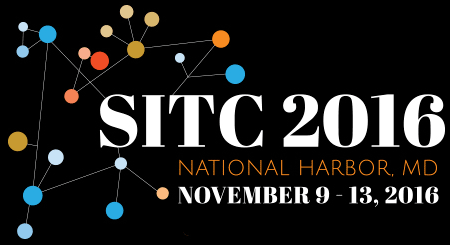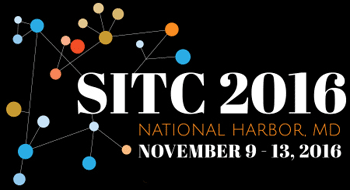Non-SITC Educational Events
New Optical Barcode Chemistries for Digital Biomarker Quantification: Spatially Resolved, Multiplexed Protein and RNA on FFPE Powers Precision Immuno-Oncology Research
Friday, November 11 · 12:30 – 1:30 p.m.
National Harbor 2
Joseph Beechem, NanoString Technologies
Immunohistochemistry is used to assess spatial heterogeneity of proteins but has limited plex and dynamic range. We developed a spatially resolved approach to quantify up to 800 targets with 5.5 logs dynamic range in a single FFPE slide. Sample is bound with antibody-oligo conjugates and regions of interest are illuminated with UV to release conjugated oligos. Eluent is collected and analyzed, resulting in multiplexed, digital readouts of protein expression. This process can be applied to the measurement of DNA, RNA, and protein for spatially resolved 3D Biology™ readouts and may enable discovery of new immune biomarkers and development of novel companion diagnostics.
Immune-Mediated Approaches in Oncology: Overcoming Tumor Immune Evasion
Friday, November 11 · 12:30 – 1:30 p.m.
National Harbor 3
AstraZeneca Pharmaceuticals
Jonathan E. Rosenberg, MD, Associate Attending at Memorial Hospital for Cancer and Allied Diseases
This presentation will discuss how disruption of the regulatory pathways exploited by malignancies to evade an immune response is a potential approach in many tumor types. Increased understanding of the interactions across pathways has opened new avenues for expanding the potential of immune-mediated approaches. This presentation aims to educate on relevant immune pathways and the rationale for an immune-mediated approach in multiple tumor types.
The Increasing Clinical Relevance of Predictive Biomarkers in Cancer Immunotherapy
Saturday, November 12 · Noon – 1 p.m.
National Harbor 2
NanoString Technologies
Understanding the Heterogeneity and Dynamics of the Response to Checkpoint Blockade Immunotherapy in Melanoma
Alex Reuben, PhD Research Fellow, University of Texas MD Anderson Cancer Center
Tremendous advances have been made in the treatment of metastatic melanoma over the last 10 years through the development of molecularly-targeted therapy and immune checkpoint blockade. However, responses to these therapies are not always durable and often heterogeneous. Major insights have been gained through molecular and immune profiling studies in longitudinal tissue over the course of therapy and have highlighted underlying mechanisms of response and resistance. Here, we analyzed longitudinal samples from patients treated with sequential CTLA-4 and PD-1 blockade by performing molecular and immune profiling in order to identify biomarkers of response and resistance to immune checkpoint blockade. In these studies, pre-treatment biomarkers were largely non-predictive with the exception of PD-L1 in pre-treatment tumor samples of patients on anti-PD-1 therapy, however this was only modestly predictive, and differences were largely overlapping suggesting that this is a suboptimal biomarker. However, when assessing early on-treatment biopsies, we identified differences between responders and non-responders to PD-1-based therapy that were highly statistically significant and non-overlapping (using a 12-marker IHC panel and gene expression profiling by NanoString). Potential mechanisms of response and resistance were also identified, with differential expression of components of the antigen processing machinery and interferon signaling pathway. Additionally, we studied a separate cohort of patients to explore potential mechanisms responsible for differential responses to targeted therapy and immune checkpoint blockade. Differential clinical responses in synchronous metastases were pervasive, and deep genomic and immune profiling revealed substantial genomic and immune heterogeneity in all patients studied. Further work is underway in these regards to help develop optimal treatment strategies in this age of personalized medicine.
Development of an RNA-based Tumor Inflammation Signature for Predicting Response to PD1 Blockade in Multiple Tumor Types
Jared Lunceford Sr. Principal Scientist, Early Development Statistics, Merck & Co., Inc.
The identification of a gene expression signature on the Nanostring nCounter system showing associations between clinical response to pembrolizumab will be reviewed using data from clinical trials KEYNOTE (KN)-001, 012, and 028. Using RNA isolated from formalin-fixed, paraffin-embedded pre-treatment samples, preliminary signatures comprised of genes associated with IFN-γ and activated T-cell biology were initially defined in a discovery set of 19 patients with melanoma from KN-001, and subsequently validated in an independent cohort of 62 melanoma patients. Refined versions of these signatures were subsequently tested in a pre-specified manner and shown to predict objective response and progression free survival in patients with head and neck squamous cell carcinoma (HNSCC, n=40) and patients with gastric cancer from KN012 (n=33), confirming a common pre-treatment phenotype in the tumor microenvironment predicts response to anti-PD1 therapy across multiple cancer types using rigorous pre-specified testing. To construct a final pan-cancer predictor or response, data were combined from 220 pembrolizumab-treated patients across 9 cancer types using penalized regression methods, yielding a final 18-gene tumor inflammation signature (TIS) that included genes related to antigen presentation, chemokine expression, cytotoxic activity, and adaptive immune resistance. The predictive value of the final TIS compared favorably with that of PD-L1 immunochemistry when evaluated in an additional independent cohort of PD-L1-unselected HNSCC patients (n=96).





Important Dates
Regular Abstracts Published in JITC
November 8, 2016
Late-Breaking Abstracts Published in JITC
December 8, 2016
Thank You, Supporters!
Thank you, SITC 2016 supporters. Because of your generosity, SITC 2016 was a great success!
Interested in supporting other SITC programs? Confirm your support today!


Connect with SITC!